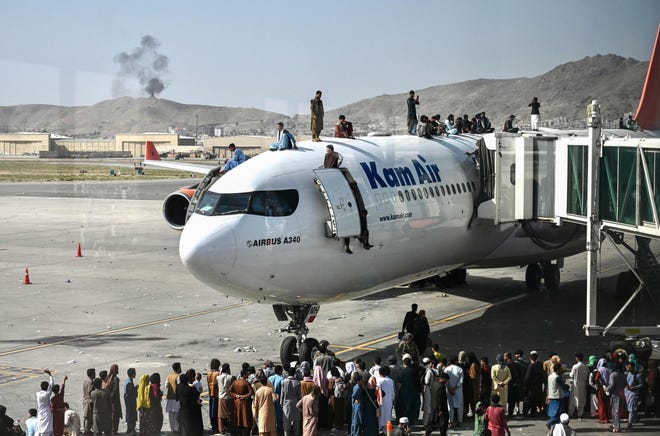
WASHINGTON – Facing intense criticism for his handling of Afghanistan, President Joe Biden will address the nation from the White House on Monday, the administration announced.
Biden has not yet spoken publicly about the Taliban's swift takeover of the country,a foreign policy debacle – particularly for a president who came to the office with decades of foreign policy experience.
Taliban fighters completed their stunning sweep by seizing control of Afghanistan’s capital Sunday as American troops scrambled to evacuate thousands of U.S. diplomats and Afghans from the U.S. Embassy.
As Biden remained at Camp David on Monday morning, National Security Adviser Jake Sullivan made the rounds of the news shows to defend the administration.
“The president had to make the best possible choice he could and he stands by that decision,” Sullivan said on NBC’s “Today" show.
But the Biden comments that much of the media continue to highlight are the president’s previous optimistic statements that it was “highly unlikely” that the Taliban would overrun the entire country after the U.S. withdrew from its 20-year involvement.

Republicans called for Biden to – as Nebraska Sen. Ben Sasse put it – “come out of hiding, and take charge of the mess he created.”
“President Biden needs to man up,” Sasse tweeted.
House Minority Leader Kevin McCarthy, R-Calif., was equally blunt.
“Mr. President,” McCarthy tweeted, along with video of Afghani's climbing aboard a taxiing U.S. Air Force jet, “Do your job and address the nation.”
Biden, who left Washington on Thursday, had been scheduled to be in Camp David in Maryland through Wednesday. He has been out of sight save for an image of him participating in a videoconference that was released Sunday by the White House.

Robert Gibbs, who served as White House press secretary during the Obama administration, called it imperative that Biden speak to the nation and the world.
“Hopefully this happens very soon,” Gibbs tweeted Monday morning. “He must lay out again the reasoning behind his decisions, how he sees the future of this region & what must be done to prevent another safe haven for al-Qaeda to plan attacks.”
Gil Barndollar, a Middle East expert at the Center for the Study of Statesmanship, said he hopes Biden owns his decision – despite how quickly the situation deteriorated – and doesn’t try to blame the Trump administration.
Barndollar said a lot of what happened in recent days was already baked into the equation after “twenty years of hubris and self-deception” about how things were going in Afghanistan.
“Trying to execute a flawless end game after that, to me, is like cramming for a final the night before after failing a course all semester,” he said.
At the same time, he added, Biden needs to give an explanation for the “massive failure” of contingency planning.
“Clearly nobody in the U.S. government really considered the absolute worse case possibility the Afghanistan government would collapse literally overnight,” he said.
Seth Jones, senior vice president at the Center for Strategic and International Studies, said Biden needs to focus less on what’s happened and shouldn’t try to deflect blame. Instead, he must address the burgeoning humanitarian crisis both of refugees fleeing the Taliban and those who will suffer under their repressive regime.
Secondly, Biden must explain how the U.S. will handle what is likely to be a resurgence of terrorist groups in Afghanistan.
“He needs to start outlining future plans rather than trying to focus on the past and spinning what's just happened,” Jones said.
Biden's return to the East Room Monday afternoon to discuss Afghanistan comes about five weeks after he got defensive when reporters pressed him on whether it was inevitable that the Afghan government would collapse.
Biden said the Afghan troops were "as well-equipped as any army in the world."
"The likelihood there's going to be the Taliban overrunning everything and owning the whole country is highly unlikely," he said.
On ABC’s “Good Morning America,” Sullivan defended Biden’s assertion.
“He thought the Afghan national security forces could step up and fight,” Sullivan said.
On NBC's "Today," Sullivan acknowledged how much that assessment was off.
“The speed with which cities fell," he said, "was much greater than anyone anticipated."

On CBS’s “This Morning,” Sullivan said Biden “was not prepared to usher in a third decade of war and put U.S. troops in harm’s way, fighting and dying to try to hold Afghanistan together when its own armed forces would not fight to hold it together.”
“This is about hard choices,” Sullivan said, “and the choice he made he believes was in the national security interest of the United States.”
Is Kabul 'Biden's Saigon?:Images of chaotic exit evoke comparisons to retreat from Vietnam







